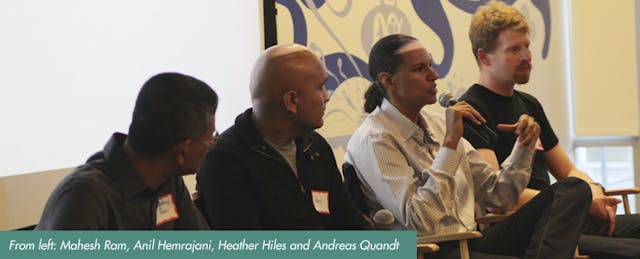Whether your startup has raised venture capital or is completely bootstrapped, the clock is still ticking in the search of a repeatable business model. So what do we know works so far?
We posed that question at a sold-out house for our August SF Edtech Meetup to a group of entrepreneurs from companies at different stages: Global English (acquired by Pearson), Big Universe (bootstrapped and recently cash-positive), Pathbrite (VC-backed) and Edmodo (VC-backed).
Nearly all of the panelists stressed the need to think about charging from day one. “The idea of ‘build it and they will come’ doesn’t work. It’s not a field of dreams, and you need to start charging from day one,” said Anil Hemrajani, CEO and founder of Big Universe Learning, a literacy and writing platform. Mahesh Ram, CEO of Global English, admitted that his company once flew an airplane over a university in Mexico exhorting them to use its then-free language learning program. “We got 10,000 signups--but no one paid.”
Finding the route to repeatable sales to sustain the company was no easy feat--especially for Hemrajani, who admitted to losing most of his hair trying to find a replicable business strategy. He tried marketing tactics like SEO and Facebook ads, but ultimately found a lifeline in a more traditional method: going through K-12 re-sellers. “If you’re bootstrapped and you’ve got a really compelling product and the price is right, that makes it a bit easier to get to re-sellers,” he suggests. “As much as I’m against the freemium model, I think it’s okay at the beginning to get some traction.”
Heather Hiles, CEO of Pathbrite, made the transition from a direct-to-teacher model to selling to enterprises and institutions and charging licenses and annual user fees. Pathbrite first focused on free trials at charter schools and case studies with universities but feedback “told us that going institution was a better bet,” she says. She had help, too: “Getting connected with a lot of institutional CIOs has been expedited with partners like Pearson, which has been a helpful sales rep channel.”
Marketing also matters, and it’s important to get started with the right salesforce, says Ram. “The first couple of sales people you hire shouldn’t just be good sales folks, but also product managers who can do some autopsy from customer feedback.” Building a sales team at an early stage may seem contrary to the “lean” trend popular among startups today, but affirms what serial education entrepreneur (currently Noodle Education founder and CEO) John Katzman wrote about being in favor of “pudgier startup[s].”
Over 150 attendees packed the house at Orrick for the event.

Selling to schools today is different from years past, says Ram. Today, schools expect to see learning outcomes reflected in data. The only problem? “They don’t necessarily know what data, so you have to educate the educators about what outcomes they should expect,” Ram says. He continues:
“At some point in the future, your buyer is going to get attacked by somebody else that your product doesn’t work and something else is better. At that point you’ll have to have educated them on how to defend your case to somebody else, and come back to your data source and explain why they were right to choose you.”
And if things don’t work out in the U.S. market, there are plenty of other fish in the sea, says Ram. “You’ve got to think about the whole world. I think that a lot of the products I see in the U.S. will do great in the international market...If I had a new company, I would focus on international K-12, in high-demand markets in places like India that have a highly competitive education system.”
Whichever market entrepreneurs decide to tap, it’s imperative for them to acquire the domain knowledge of the education industry--particularly the difference between consumer (parents) and institutional markets, says Hemrajani.
Of the companies represented, only Edmodo is following the Facebook-LinkedIn model of building a huge audience with support from hefty venture capital. Even so, noted Andreas Quandt, head of product and analytics at Edmodo (and formerly with Facebook), entrepreneurs should realize that edtech isn't like the consumer web: “You should not go into this space for financial reasons," he cautioned. "You need to have the vision and conviction that you can build the right product and do everything right. And you will need a lot of patience and perseverance and grit.”


